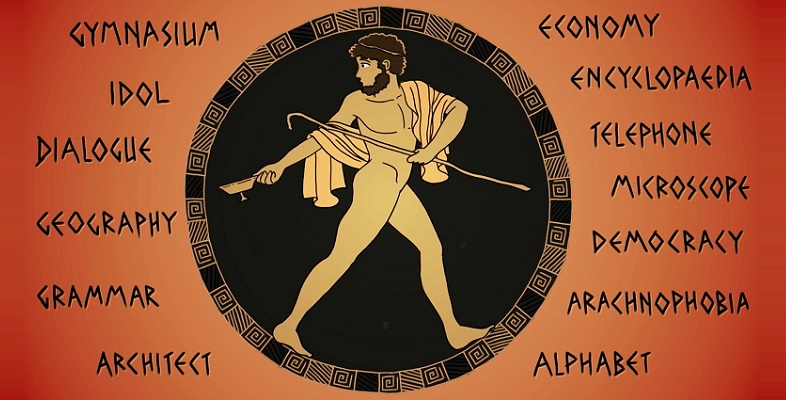1 Greek and English
The contribution of Greek to English tends to be more evident in specialist or technical vocabulary than in ordinary, everyday English words. This reflects the fact that Greek literature offered a large stock of ideas and technical terms that subsequent readers could draw upon and incorporate into their own languages. It also reflects the historical importance of ancient Greek within European education, until well into the twentieth century.
To take one example: although English uses the word ‘tree’ where Greek uses the word δένδρον, the Greek form dendron is still visible in English, in words such as ‘rhododendron’ or ‘dendrochronology’ (‘the measurement of time through the study of tree-rings’). These terms, the second of which is rather long and intimidating, can be broken down into some simple Greek elements:
- rhododendron ῥόδον (rose) + δένδρον (tree)
- dendrochronology δένδρον (tree) + χρόνος (time) + λόγος (word or account)
As it happens, δένδρον is used as a stand-alone word in English, although characteristically it is used in a technical sense: a dendron, or dendrite, is a ‘short, branched, thread-like extension of a nerve-cell’.
Let us begin with some words that have been incorporated into English almost to the letter.
Activity 1 English derivations from Greek (1)
Identify the English words derived from these Greek terms. Recall that upsilon can become either ‘u’ or ‘y’ in English. Kappa is often represented by ‘c’ rather than ‘k’.
- γένεσις
- ἰδέα
- δρᾶμα
- κάθαρσις
- καταστροφή
- κόσμος
- μανία
- νέμεσις
- πάθος
- ὕβρις
- ὑπόθεσις
- χάρισμα
Discussion
The Greek words, with translations, are given below.
- genesis γένεσις (birth, origin)
- idea ἰδέα (the look or form of a thing)
- drama δρᾶμα (a deed, act)
- catharsis κάθαρσις (purification)
- catastrophe καταστροφή (overturning, subjugation)
- cosmos κόσμος (good order; also, the world or universe)
- mania μανία (madness)
- nemesis νέμεσις (justifiable anger, divine retribution)
- pathos πάθος (suffering)
- hubris ὕβρις (insult, an act of violence against a person)
- hypothesis ὑπόθεσις (a supposition)
- charisma χάρισμα (a divine gift)
Usually a Greek word enters English with a slight change of form. Changes typically occur at the end of the word, for example ‘cataclysm’, from κατακλυσμός (‘deluge’) or ‘poet’, which is related to the Greek ποιητής (‘poet’, or ‘maker’).
Activity 2 English derivations from Greek (2)
Can you think of English words derived from these Greek terms?
- ἆθλον (prize)
- ἀκούω (I hear)
- βίος (life)
- γράφω (I write)
- μικρός (small)
- ναυτικόν (fleet)
- στρατηγός (a general)
Discussion
Perhaps you suggested some of the following words:
- athlete, triathlon
- acoustic
- biology, and many other words like bioscience, biosphere, biotechnology
- graph, graphic
- microbe, microscope, omicron (‘little o’)
- nautical
- strategic, strategy
The path leading from Greek to English is sometimes unclear. You might need to pause for a moment to detect the connection between the meaning of an English word and its Greek ancestor. It helps to know that γράφω, for instance, has a wider range of meanings than ‘write’. It also covers ‘paint’ and ‘draw’, which helps explain its appearance in ‘graph’ and ‘graphic’.
